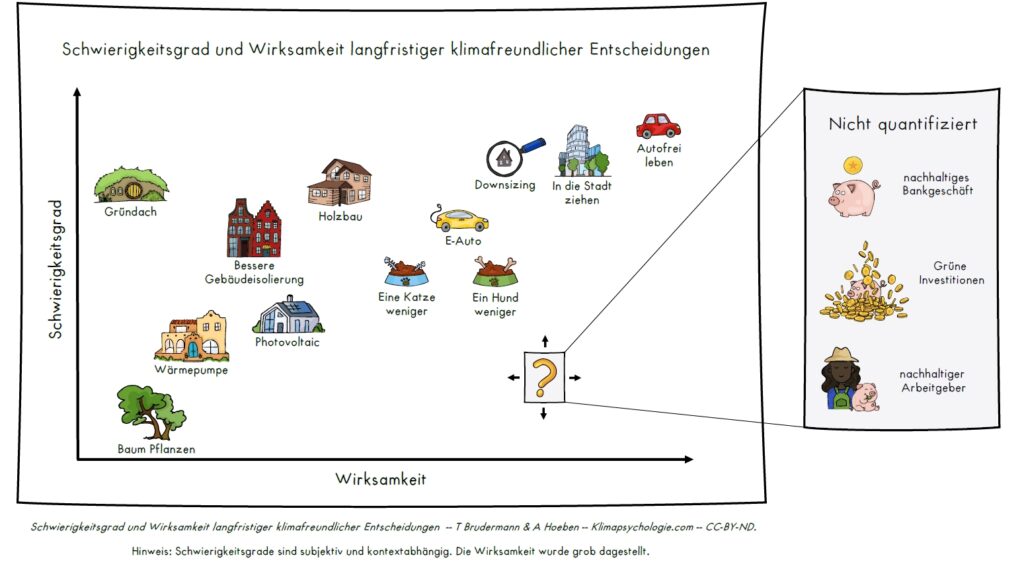Science and politics are in agreementThe global Climate change has become an existential problem for us as humanity and our environment. The increasing pressure to act therefore requires more and more concrete action at both a social and individual level.
In previous articles, we have already looked at how companies can optimise their Systematically determine CO2 balance which central questions should be answered and which Calculation tools are suitable. We have also looked at how operational climate protection measures implemented step by stepcan be realised.
Carbon footprints, targets and action plans are undoubtedly important prerequisites for a successful corporate climate protection strategy. However, when it comes to the practical implementation of climate protection in everyday (working) life, it is usually just as important to keep an eye on psychological factors at an individual level (e.g. among managers and employees). On the one hand, this includes Motivating people for sustainability and, on the other hand, to break down psychological barriers to climate-friendly behaviour in everyday life and at work.
We have therefore worked with Prof Thomas BrudermannPhD in psychology and Professor of Innovation and Sustainability Research at the University of Graz in Austria, talked about human decision-making behaviour in climate protection in everyday life and the prerequisites for more climate-friendly behaviour in everyday life and at work.
Contents
- How did you come to write a book on climate-friendly behaviour?
- What experiences from research and your private life have been incorporated into your book?
- Can you give us a flavour of your own findings?
- What are your top 3 favourite excuses?
- If we take up the second statement with a view to other countries such as China: What is the psychological effect behind this?
- Is our inaction on climate protection due to the fact that we have something embedded in our genes from an evolutionary perspective?
- What would be an important framework condition for more climate-friendly behaviour?
- Do you think the responsibility for more climate protection lies more with each individual or more with state institutions?
- What would you advise companies to do to overcome their employees' "inner pig dog" and motivate them to protect the climate?
Background
The cruise in the Caribbean, the beef steak in the restaurant, the quick coffee from the capsule machine: we are usually aware of the underlying problems and would like to do more to protect the climate, but often it just doesn't work. We are all familiar with the "inner bastard", and not just when it comes to the environment.

Psychologist Thomas Brudermann knows about the countless excuses we have at the ready when climate protection becomes too stressful and uncomfortable. In his book "The art of the excuse" he focuses on the most common excuses that stand in the way of climate-friendly behaviour on a personal level and sheds light on the psychological patterns behind them.
In an interview with plant values, he explains why we often find the supposedly correct behaviour so difficult, how we can perhaps trick our inner bastard after all and gives tips for companies.

In his research work and teaching activities, Prof. Thomas Brudermann deals with various topics from environmental and climate psychology, economic psychology, behavioural economics and sustainability research. He places a particular focus on the decision-making behaviour of citizens, consumers, households and organisations.
In the Science2Public area, he gives lectures/interviews on topics such as Sustainabilityclimate psychology, decision-making behaviour or mass psychology.
The interview
How did you come to write a book on climate-friendly behaviour in everyday life and at work?
"In my university research and teaching, I have been dealing with the following question for over 10 years: How is it that many people are somehow environmentally and climate-friendly, and yet are burning up the planet, accepting the loss of entire ecosystems and leaving an ecological shambles for our next generation? That doesn't really go together.
Of course, there are structures that promote these catastrophic developments, but very little is happening on an individual level either. People are concerned about the climate and still go on holiday twice a year, eat steaks and buy an unnecessarily large number of cars. This should actually trigger a massive inner contradiction in all of us. But it hardly does. We find enough reasons for what we do or don't do. Some reasons may be legitimate, but many come from the realm of excuses. I wrote the book through a rather random inspiration - I gave an interview to a daily newspaper last year and the headline was 'Nice excuses for climate sins'. 'I should write a book about that', I thought to myself as I was reading it, and then I did."
What experiences from research and your private life have been incorporated into your book?
"Over 100 studies and my own research work have been incorporated into the book. But 'The Art of the Excuse' is not meant to read like a science book. There are enough of them and only a few of them are fun to read, especially when it comes to climate issues. On the contrary, there is always an acute risk of frustration and depression with this topic. That's why I illustrate the scientific findings with anecdotes and personal experiences. Self-irony and humour are not neglected, because the topic is serious enough anyway. I think you can also laugh about serious topics, especially if it makes you think."
Can you give us a flavour of your own findings?
"I think all of us have fallen into the trap of 'moral licensing' at some point. It's a well-documented phenomenon: you behave in an environmentally friendly way in a few areas and occasionally treat yourself to an overseas flight - without a guilty conscience. This logic also seems to be quite common among sustainability researchers: 'We have to fly to conferences, we are working on important topics with which we can make a positive contribution'. At the beginning of my scientific career, I also used to rationalise my flights in this way. At some point, however, I had to realise that this is actually a pretty cheap excuse with a lot of hypocrisy."

What are your top 3 favourite excuses?
"I don't have any favourite excuses myself. I've dealt with all of them thoroughly, and that has a 'disadvantage': I no longer believe my own excuses.
But the most popular excuses I come across are:
'I'm already environmentally friendly, I separate my rubbish',
'It's much worse in China/India/Africa' or
'It's already too late anyway.
All three excuses are self-lies, but they are also human - they can easily be explained by psychological effects."
If we take up the second statement with a view to other countries such as China: What is the psychological effect behind this?
"In psychology, there is the effect of 'environmental far-sightedness'. This describes the tendency to regard environmental problems elsewhere as worse than the problems locally. Rising emissions in China are then perceived as bad, but the increase in CO2 emissions from transport here in Germany since 1995 is not. Somehow it's practical: we can't do anything elsewhere. Here in Germany, we don't have to do anything."

Is our inaction on climate protection due to the fact that we have something embedded in our genes from an evolutionary perspective?
"If we want to understand human behaviour, we have to look at two things: Firstly, cognition, all the psychological variables such as attitudes, perception, intentions, etc. But that alone won't get us very far. Secondly, in my opinion, the framework conditions within which decisions are made are even more important. These are structures, social practices, market mechanisms. Many of these existing framework conditions and structures are harmful to the climate. As a consumer or citizen, I can easily talk my way out of this if I am not climate-friendly. We don't just need information and more awareness of the problem. Above all, we need framework conditions that make it easier for us to be climate-friendly and harder to make excuses."
What would be an important framework condition for more climate-friendly behaviour?
"Let's take the example of nutrition: if I want to eat a climate-friendly vegan diet, it can be quite difficult in some places: plant-based products are not only less available, but also more expensive than subsidised chicken or pork. However, if there is a large selection of delicious plant-based dishes in the canteen, this automatically reduces meat consumption.
The climate-damaging option is also often cheaper, more convenient and faster when it comes to mobility. If I want to take the train from Antwerp to Vienna, for example, I have to book two tickets on two different platforms. And in Germany in particular, it can sometimes happen that you have to wait two hours on a freezing cold platform for a delayed night train at 1 a.m. in January. Climate friendliness simply has to become more attractive and easier at all levels."
Do you think the responsibility for more climate-friendly behaviour in everyday life and at work lies more with each individual or more with state institutions?
"People like to pass the ball back and forth, and that doesn't get us anywhere. Of course, the state and companies have a responsibility to create more sustainable framework conditions. As a citizen, I can demand this. But I can also make contributions in my own area of life. I don't have to wait for the state to reduce or stop eating meat. I can do that on my own. And I can also unsubscribe from airline newsletters and don't have to follow all the influencers on Instagram who are constantly posting pictures of exotic destinations."

What would you advise companies to do to overcome their employees' "inner pig dog" and motivate them to protect the climate?
"It stands and falls with the commitment of the management level. If the management comes to work in a Jaguar, why should the employees use public transport? Leading by example is far more effective than moralising. And then, of course, you can create conditions that make it as easy as possible for employees to be climate-friendly: Covered bicycle parking spaces if possible, perhaps even company bicycles. Time spent on public transport could be counted as working time. An attractive vegan offer in company canteens. Meetings increasingly digital - you don't have to drive two hours or even get on a plane for an hour's meeting. There is enormous potential in companies if you just want to. And most emission savings also have positive side effects: Employees are more productive after a vegan lunch than after a roast pork dinner, cyclists are healthier than car drivers. And digital meetings save an enormous amount of working time. Climate protection should not automatically be perceived as a burden and a restriction. Climate protection can also be very beneficial."
We would like to thank Thomas Brudermann for the interview. For further information on climate-friendly decision-making behaviour in everyday life and at work and the "art of the excuse", we recommend Thomas Brudermann's Talk as part of the TEDx event in Haslach.
You can read more about climate protection in a corporate context here in our blog:
- Motivating employees in the company for sustainability - 15 concrete approaches
- Does climate change really exist?
- FAQ: Frequently asked questions about the carbon footprint in companies
- 3 steps to a CO2 balance in the company
- CO2 calculator for companies in comparison
- Climate protection measures in companies: Step-by-step guide

Are you planning the next steps towards sustainability?
Ask me for a free information meeting.
I am ready with advice and pleasure.
Matthias Damert
Sustainability, climate and energy management





[...] Interview with psychologist Prof. Brautmann: How to promote environmentally friendly behaviour in everyday life... [...]